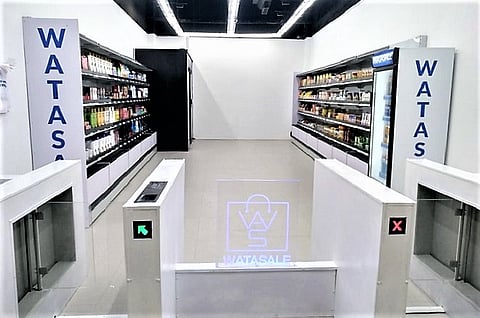

When people started shopping online in the comfort of their homes, several sceptics felt it took away the ‘experience’ that a physical retail would offer. Soon, several online stores went offline, including BigBasket, which launched VR stores to bring back the shopping experience. Then, some like Amazon decided to automate the retail industry. Last year, the e-commerce giant opened Go store, an automated no-checkout store in Seattle, which was touted to be the future of retail. Now, Kochi also has one.
Taking a cue from Go Store, a Kochi-based startup has bet on automated retails stores and opened Watasale - India’s first checkout-free store.
Like any other store, Watasale sells ready-to-eat, ready-made items, chips, snacks, beverages, packaged items and personal care products. The difference, however, is that there are no cashiers, cash counters or queues; all a customer needs is a smartphone to bill the products.
“This idea struck us three years ago when major companies such as Amazon started thinking automating the retail setup,” says Rajesh Malamal, the chief marketing officer of Watasale. “Several e-commerce delivery platforms failed and online groceries were shutting down. With even big giants going for automation, we also thought that this is what the future of retail will be.”
What is a checkout-free automated store?
Enter, pick up your product and leave - it’s as simple as that. The bill is autogenerated and automatically deducted from the Watasale app.
Every customer has to download the Watasale app before entering the store in Kochi. The app generates a unique QR code for the customer. The gates to the store will open only when the customer scans the code. Once inside, customers can pick up what they want and walk out. Once they walk out, they receive the bill for the products picked up and the amount is auto deducted from their wallet or credit card.
How does it work?
The entire experience of the store works on a combination of computer vision, artificial intelligence (AI) and sensor fusion.
When you enter, computer vision scans each customer through cameras and recognises them based on skin tone, clothes, etc among other physical aspects. When a product is picked up, AI, sensor fusion and computer vision help register the action and add the product to the bill.
“AI, computer vision, sensor fusion merge at a single point and identifies the shopping pattern and generates the bill to the customer. If a customer does not want a product he/she picked up, it can always be put back. The system calculates all products that have been picked up and put back only when the customer leaves the store and generates the bill accordingly,” Rajesh explains.
The current store, which is less than 1000 square feet in size, can accommodate about 20 to 25 people but Rajesh says that there is no limit on the footfall the technology can handle. However, a crowded store could mean slightly longer bill generation time. It usually takes an average of 10 minutes to generate a bill.
“But the best part is that a customer does not need to wait at the store for the bill. He can leave and the bill will get generated and auto debited. So there is no waiting time as far as the customer is concerned,” he adds.
Despite being a first-of-its-kind store, there have been no errors, he claims. “There is one thumb rule though. If a person picks up a product, the same person has to put it back if they don’t want it. If someone else puts it back, the technology counts it in the bill as the computer vision has already recorded and registered the original customer’s physical features,” Kochi-based Rajesh adds.
Expanding to other cities
Since launch, Rajesh says that the response to the store has been great, most of them coming out of curiosity for the new experience, including from other cities like Mumbai.
Watasale now wants to expand and set up stores in other cities, Bengaluru being the next destination, followed by Delhi. But before expanding to Bengaluru, the startup is experimenting in terms of tweaking the product, adding new categories for products and trying out various sale scenarios.
“In three months, we are planning to set up a store in Bengaluru with more features. We want to do more in the next stores we set up and offer the entire range as a supermarket,” Rajesh says.
Watasale also plans to set up micro-stores in corporate offices and apartment complexes. This, Rajesh says, will be like a refrigerator that will have essential items that customers can just scan, pick up and leave. This model, he says, is easy to scale. The plan is to set up 100 micro-stores.
But further expansion will need more funds. While the Kochi store was bootstrapped, Rajesh is now looking to raise more funds to be able to expand to new cities.
“The initial investment for the first store was high especially due to the research and development that went into it. Opening another store will be easy since we have all the codes and just need to get the hardware and install them in a new setup,” he says.